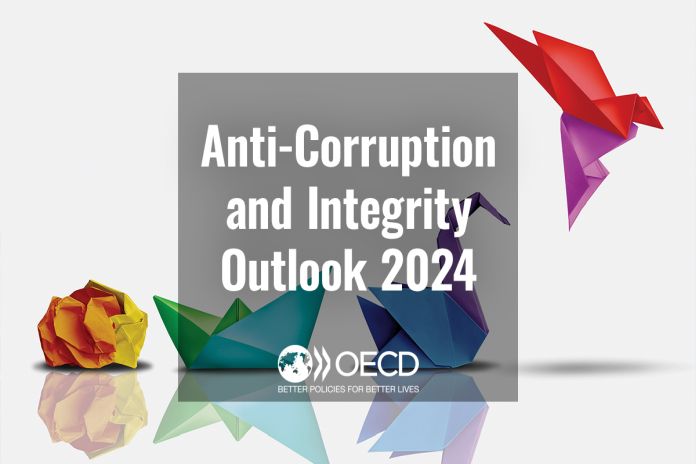PARIS, France – Anti-corruption and integrity frameworks are improving, but there is a need for renewed efforts to strengthen them globally by prioritising implementation, enhancing data collection, and taking account of emerging risks, says a new OECD report.
The Anti-Corruption and Integrity Outlook outlines the current performance of countries’ anti-corruption and integrity policies and practices and identifies avenues for enhancement. Drawing on new data from the OECD Public Integrity Indicators, the Outlook also sheds light on how emerging global challenges are impacting anti-corruption and integrity efforts.
Strengthening integrity and tackling corruption is essential for safeguarding citizens’ trust in democratic governance, making economies more productive by providing a supportive business environment for innovation, competition and investment, and ensuring public sector resources are effectively allocated at a time of significant fiscal pressures.
OECD countries have been bolstering their anti-corruption and integrity frameworks, with regulations becoming increasingly comprehensive and sophisticated. However, countries must also improve their ability to monitor the effectiveness of policies and processes in mitigating corruption risks and upholding integrity.
“No country is immune to the risk of corruption and the consequent adverse impacts that follow. OECD countries’ anti-corruption and integrity frameworks are becoming more comprehensive and sophisticated, but there remains a large implementation and data gap”, OECD Secretary-General Mathias Cormann said. “Strengthening the implementation and broadening the scope of integrity frameworks is increasingly important as governments face additional corruption risks from the green transition and the race to secure critical minerals, the rise of AI, and increasing foreign interference.”
OECD countries have intensified efforts to develop a strategic approach for mitigating corruption risks. Since 2020, many OECD countries have developed an anti-corruption or integrity strategy for the first time, such as Costa Rica, Finland, France, Switzerland, and the United States, and 71% of OECD countries now have a strategy in place.
However, only 40 percent of those monitor whether planned activities are implemented, and 76 percent of countries do not track what jobs senior office holders take upon leaving public office, potentially exposing them to conflicts of interest. Similarly, there is a lack of data on the implementation of internal auditors’ recommendations.
In addition, the Outlook documents implementation gaps across all areas. Notably, while regulations on conflict of interest are robust, meeting 76 percent of OECD standard criteria, their practical implementation lags, with an average of only 40 percent of OECD criteria on practices being met.
The Outlook is the first in a new series of biennial reports which will track the performance of OECD countries’ integrity frameworks and analyse integrity risks.





